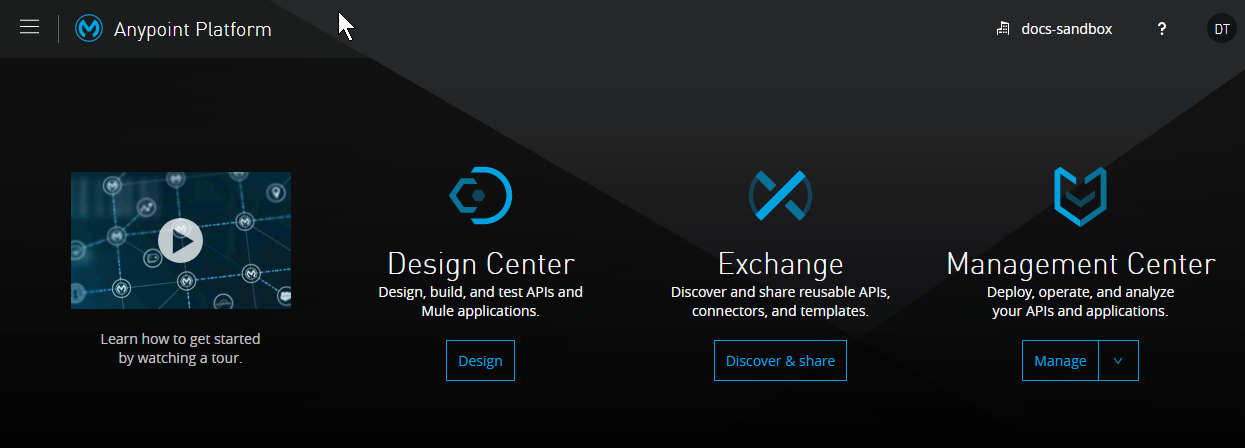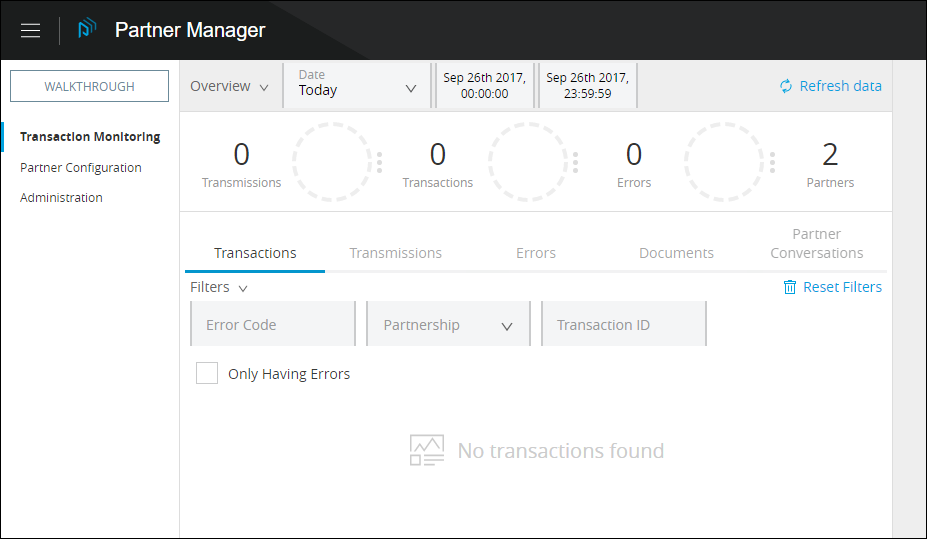
Anypoint Partner Manager
| Anypoint Partner Manager V1.0 was deprecated in March 2021. Its End of Life is March 31, 2022. Support for Anypoint Partner Manager 1.0 continues in accordance with the Product Support and Maintenance Terms but is not available for new customers or upgrades. For the latest version of Anypoint Partner Manager, contact your Customer Success Manager to determine how you can migrate to the current version. |
Anypoint Partner Manager (APM) provides a single web-based user interface for Transaction Monitoring, Partner Configuration, and Administration.
Transaction Monitoring
Because B2B transactions often communicate contractual obligations between companies, it is desirable (and often necessary) to track all transmissions sent or received, storing the transmission content as well as metadata (such as data and time the transmission was sent or received, the identity of the partner, and success or failure of processing). APM provides a simple, secure, and integrated mechanism for tracking transactions within MuleSoft flows. Uses for this data include
-
Non-repudiation.
-
Correlation of acknowledgments.
-
Error correction.
-
Auditing.
For more information, see Transaction Monitoring.
Partner Configuration
APM provides the ability to edit, store, and retrieve configuration settings for the transport and format of B2B messages. For example, EDI messages are often sent over the AS2 protocol in order to ensure security and integrity of the transmissions. Each trading partner may have different AS2 settings; for example, each partner will have its own certificate. In addition, different partners may use different format protocols such as EDI X12, EDIFACT, or XML, and they may use different options within those protocols. APM allows this configuration data to be managed outside of your Mule applications, so that they can be reviewed without looking at the code and updated without re-deploying your Mule flows.
For more information, see Partner Configuration.
Administration
Your company is considered a trading partner in that all the settings you can configure for a trading partner, you can configure for your company. However, APM also offers other settings that apply only to your company, such as security settings.
For more information, see Administration.
Key Concepts
Tracking metadata discussed in Partner Configuration is stored in a database in CloudHub, and the actual transmission content is saved to an S3 bucket or to a customer-provided transmission persistence storage. Find more information about this and other conceptual topics in Key Concepts.
Examples
In the most common scenario, APM is used in conjunction with Anypoint Studio, Partner Manager Connector, and other MuleSoft connectors. Find information about this and other APM use cases in Examples.
Start Anypoint Manager
-
Sign up to use Anypoint Platform.
-
Log into Anypoint Platform. The Anypoint Platform Application Selection Page appears.

-
On the Anypoint Platform application selection screen, in the Manage drop-down listbox, click Partner Manager.
The Transaction Monitoring Page appears.
For more information, see Transaction Monitoring.

-
To configure or edit the configuration of a trading partner, see Partner Configuration.
To edit or configure settings for your company, see Administration.
Access Management
Use Anypoint Access Management to create APM users and manage their roles.
APM roles include the following:
| Task | Privilege | Scope |
|---|---|---|
View Partners |
Can view all partners and their information and settings. |
Assigned per environment |
Manage Partners |
In addition to privileges of View Partners, can add new partners and update information and settings for partners. |
|
View Transactions |
Can view data in the B2B Transactions monitoring screen. |
|
Manage Transactions |
In addition to privileges of View Transactions, can replay transactions. |
|
Administer Partners |
In addition to all the privileges of Manage Partners and Manage Transactions, can generate new Api Keys for the organization and promote Partner settings across environments. |
Assigned per Business Group. Has privileges in all environments in the Business Group. |



